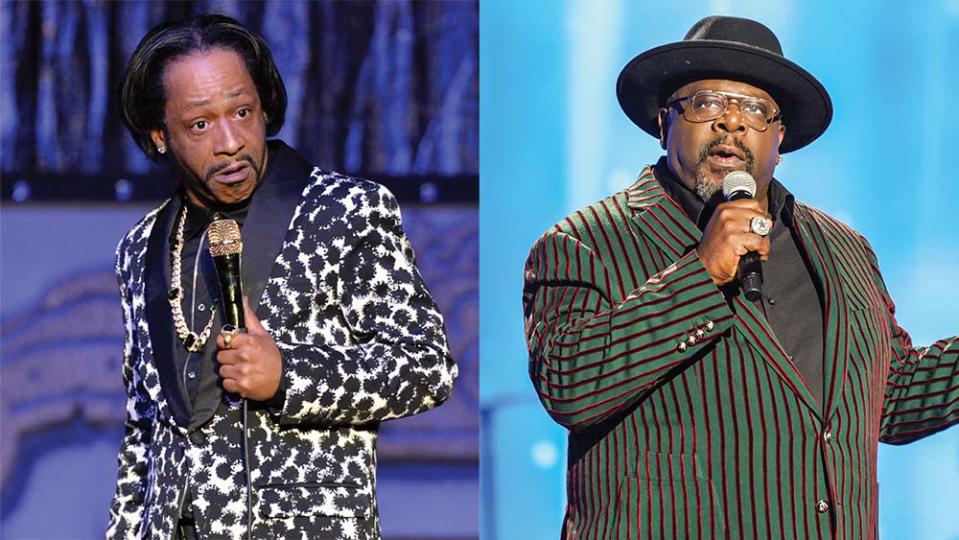Stealing Jokes Is Taboo, So Why Do Comedians Keep Doing It?
- Oops!Something went wrong.Please try again later.
- Oops!Something went wrong.Please try again later.
- Oops!Something went wrong.Please try again later.
- Oops!Something went wrong.Please try again later.

In early January, comedian Katt Williams went on Shannon Sharpe’s Club Shay Shay podcast and took aim at Cedric the Entertainer for stealing “my very best joke.” The bit in question — which involved a pantomime of driving with music blasting — was first performed by Katt in a 1998 appearance on ComicView, then reproduced by Cedric (according to Katt) for his set in Spike Lee’s The Original Kings of Comedy. Cedric called the accusations “revisionist history” on Instagram.
We’ve been down this road many times before. For much of the 20th century, joke stealing was an open secret. “All comedians steal from all comedians,” the legend Stan Laurel once mused. Some of the biggest names in comedy did it. Milton Berle was so blatant in his joke stealing that he earned the nickname “The Thief of Bad Gags.” Richard Pryor admitted on The Tonight Show that he ripped off his comedy idols, like Dick Gregory, “on purpose” and “made a lot of money as Bill Cosby.” Cosby himself didn’t protest, as he was too busy stealing from George Carlin.
More from The Hollywood Reporter
Robin Williams offered financial restitution, once handing a $300 check to a comic whom he’d ripped off and adding a request: “Don’t cash it till Tuesday.”
Conan O’Brien was sued for $600,000 by freelance writer Robert “Alex” Kaseberg in 2015 for stealing several jokes from his blog and Twitter account. The case was settled out of court in 2019, with Conan explaining in an open letter that he wanted to “forgo a potentially farcical and expensive jury trial.”
Legally, proving joke theft is almost impossible, unless it’s egregiously obvious. “You can’t copyright a joke like you could a magic trick or with an invention,” says Mike Sacks, author of And Here’s the Kicker: Conversations With 21 Top Humor Writers on Their Craft. The biggest danger of joke stealing has always been reputational. Not with audiences, but with fellow comics. “If you’re kicked out of the comedy community, you’re on your own, and it’s not a good place to be,” Sacks says. “Reputation is everything for a comedian, even if they’re multimillionaires.”
Dane Cook, who purportedly stole several jokes from Louis C.K. during the late aughts, wasn’t able to recover from the scandal, even after an awkward appearance on C.K.’s FX series Louie in 2011. Though he was one of the few comics to sell out Madison Square Garden and once had a huge social media following, today Cook tours just sporadically and is vying to become the “king of Threads.”
Carlos Mencia, meanwhile, is still asked in interviews to answer for his alleged joke theft 17 years after his showdown with Joe Rogan over it.

W.C. Fields was rumored to have paid somebody $50 to break the legs of somebody he suspected of stealing his jokes, but few accused comedy thieves in the modern era have faced such dire consequences. Much of Denis Leary’s early stand-up routine was suspiciously similar to Bill Hicks’ act, including several jokes lifted almost word-for-word, but it didn’t stop Leary from having a successful film and TV career. In 2022, when James Corden was caught stealing a routine from Ricky Gervais’2018 special Humanity, Gervais mocked him on Twitter and then just as quickly forgave him.
The same year, Amy Schumer told a joke about the youth of Leonardo DiCaprio’s girlfriends during the Oscars that some viewers noted was a bit too similar to a viral tweet from a year earlier. When asked about the joke’s origins, Schumer insisted she’d never “personally been on Twitter” and blamed the joke’s creation on another writer, Suli McCullough.
Twitter — now called X — was briefly ground zero for comedy policing. But today, jokes are stolen with impunity. Even the social media site’s owner, Elon Musk, has been accused by comics of pillaging jokes without a second thought to who might have written them. When he reshared a meme about a dog’s haircut in 2020, the joke’s author, comic Morgan Murphy, complained in a tweet: “Hi this is my joke & my dog. His name is Jack. May I have a car please?”
Todd Jackson, who runs Dead-Frog, an online stand-up comedy database, says it’s “pretty rare” for bona fide comics to have malicious intent in echoing jokes. “You have to have your own act at some point to get anywhere in the business,” he says. “Parallel thinking is much more common. Multiple performers can pick up something going on in our culture at relatively similar times.”
Stand-up veteran Bobby Kelton, who got his start in the ’70s performing with Billy Crystal, Andy Kaufman and Larry David, says joke stealing was the exception rather than the rule at the time. “We honored each other’s material,” he says. “There was an unwritten code that you didn’t steal.”
Now in his sixth decade as a stand-up, Kelton says that today’s comedy landscape is lawless by comparison: “It’s the Wild West.” Just a week ago, he says, he performed at a club in Florida (where he’s based), and the opening comic brazenly repeated one of Kelton’s jokes, well aware that the older comedian was in the audience. When Kelton confronted him, the comic apologized and shrugged.
“What can you do?” Kelton says. “Nothing. But that’s why I always watch who’s on before me, just in case they do some of my material. I don’t want to look like a fool.”
This story appeared in the Jan. 10 issue of The Hollywood Reporter magazine. Click here to subscribe.
Best of The Hollywood Reporter

